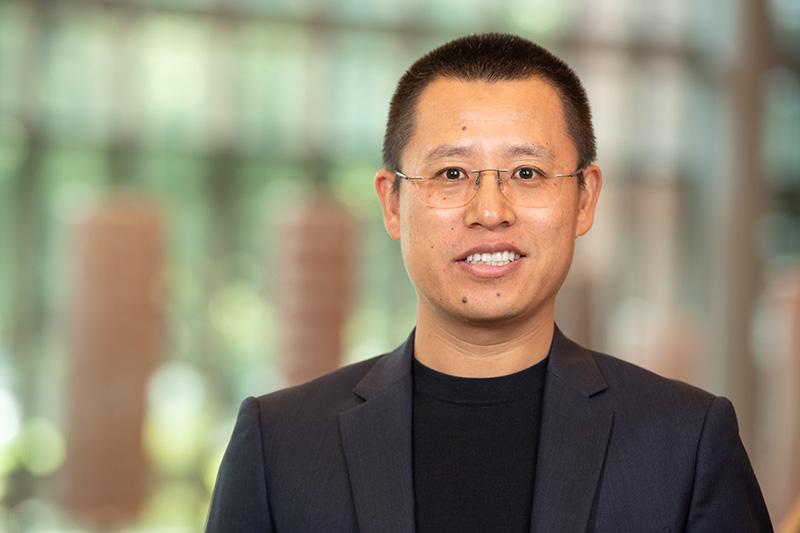An unintended consequence of political skill in the workplace

Social competencies and social skills have become widely recognized as crucial factors influencing an individual’s success. These concepts can be traced back to the 1920s, when educational psychologists and psychometricians coined the term “social intelligence” to refer to the ability to understand and manage people.
In work settings, social intelligence and competencies are often referred to as “political skill,” suggesting an ability to influence others to achieve workplace goals. Research has shown that politically skilled employees enjoy numerous advantages, such as building more favorable reputations, developing more extensive and critical networks, and enjoying better career prospects and upward mobility.
Shuhua Sun, however, has uncovered surprising findings in his examination of existing empirical research. Sun, an associate professor of management at the Freeman School, points out unexpectedly equivocal and even positive associations between employee political skill and co-worker social undermining behaviors.
“These empirical findings suggest that employee political skill can evoke co-worker social undermining, such as spreading rumors and withholding important work information, but no existing theory explains why and when politically skilled employees become targets of such behaviors,” Sun says.
Sun’s 2022 paper “Is Political Skill Always Beneficial? Why and When Politically Skilled Employees Become Targets of Coworker Social Undermining” sought to shed light on these complexities. Drawing from social rank theory in evolutionary psychology and the theory of rivalry in management research, Sun developed a theory that explains how competition at work can make political skill backfire and paradoxically attract coworker social undermining.
Through one survey study and three experiments, Sun found that when employees see themselves to be in a competitive relationship with politically skilled coworkers, they tend to engage in social undermining to diminish the politically skilled coworkers’ advantages. This negative response tends to disappear when there is no competition, but it intensifies when the competitive relationship escalates into interpersonal rivalry. Rivalry differs from competition, which is any situation where multiple parties vie for scarce resources. For example, in the workplace, the competition could be over better assignments, bonuses and promotions. If two individuals with similar qualifications repeatedly compete for these things and have equally matched results, competition can escalate into interpersonal rivalry.
In light of these findings, it becomes essential for managers and organizations to critically assess their human resource management practices. While competitions, such as tournaments and contests, are believed to enhance performance and are widely used, they can also inadvertently foster cutthroat competition and rivalry among employees, fostering potentially toxic behaviors such as social undermining.
“To avoid such negative consequences, fostering a collaborative and inclusive atmosphere where all employees feel valued – and emphasizing self-improvement and common goals over ranking employees in a rat race – is crucial,” Sun says.
Sun says employees can harness the benefits of political skill while mitigating the risk of social undermining by using their political skill positively and ethically, such as building genuine and positive relationships with coworkers instead of engaging in more competitive status-jockeying games.
Additional research by Sun and his co-authors suggests that engaging in power struggles leads to a sense of power but comes at the cost of emotional exhaustion, regardless of one’s political skill level. Employees who actively distance themselves from negative social dynamics and focus their energy on challenging tasks, on the other hand, tend to become more creative at work.
Sun says employers and employees need to know that political skill can’t prevent all negative interpersonal outcomes, particularly in a workplace characterized by high levels of competition and rivalry. Organizations should balance competition in the workplace with cooperation and reduce interpersonal rivalries to prevent the adverse effects of political skill. By using political skill ethically and positively, employees can leverage its advantages while avoiding potentially harmful consequences, ultimately leading to a more productive and creative workforce.
Sun’s article “Is Political Skill Always Beneficial? Why and When Politically Skilled Employees Become Targets of Coworker Social Undermining” was published in Organization Science in May 2022. In addition, his article “Is Political Behavior a Viable Coping Strategy to Perceived Organizational Politics? Unveiling the Underlying Resource Dynamics,” co-authored with Huaizhong Chen, appeared in Journal of Applied Psychology in October 2017, and his article “Crafting Job Demands and Employee Creativity: A Diary Study,” co-authored with Nan Wang, Jinlong Zhu and Zhaoli Song, appeared in Human Resource Management in November 2020.
--Maria Clark
Interested in advancing your education and/or career? Learn more about Freeman’s wide range of graduate and undergraduate programs. Find the right program for you.
Other Related Articles
- Forbes: 4 Remedies For Reducing Generative AI Mediocrity
- Research Notes: Shuhua Sun
- Research Notes: Alissa Bilfield
- Quartz: Companies that replace workers with AI ‘risk mediocrity,’ expert warns
- BBC News: ChatGPT will soon allow erotica for verified adults, says OpenAI boss
- OHSonline: From the Battlefield to the Workplace - How Staff Rides Improve Safety Decision Making
- Tulane launches technology ethics course bridging science, business and the humanities
- Techstrong.ai: Musk Sues OpenAI, Apple For ‘Anticompetitive Scheme’
